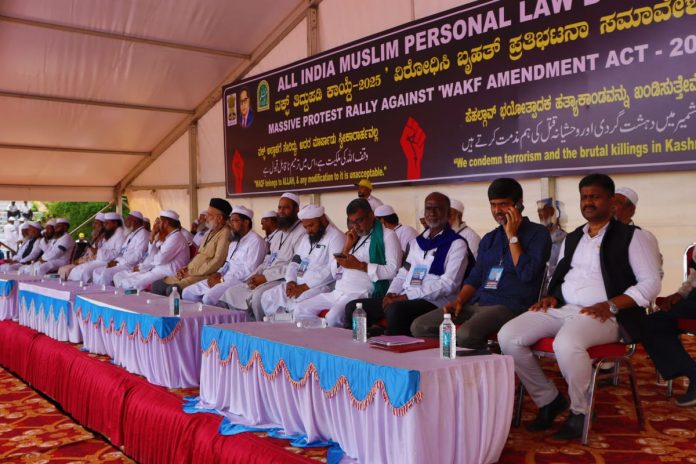Tipu’s Legacy, Ambedkar’s Dream: United Against Constitutional Erosion
– Mohammed Talha Siddi Bapa
Mysuru: In a powerful display of dissent and unity, over 25,000 people – men, women, youth, and elders – gathered at the historic Eidgah Maidan here Saturday to protest the controversial Waqf (Amendment) Act 2025, introduced by the Union Government. Organised under the banner of All India Muslim Personal Law Board (AIMPLB), this massive protest was part of an ongoing national movement, with daily demonstrations erupting across the country – from Delhi to Hyderabad, Patna to Bhopal – against what is widely perceived as a direct assault on constitutional freedoms and religious autonomy.
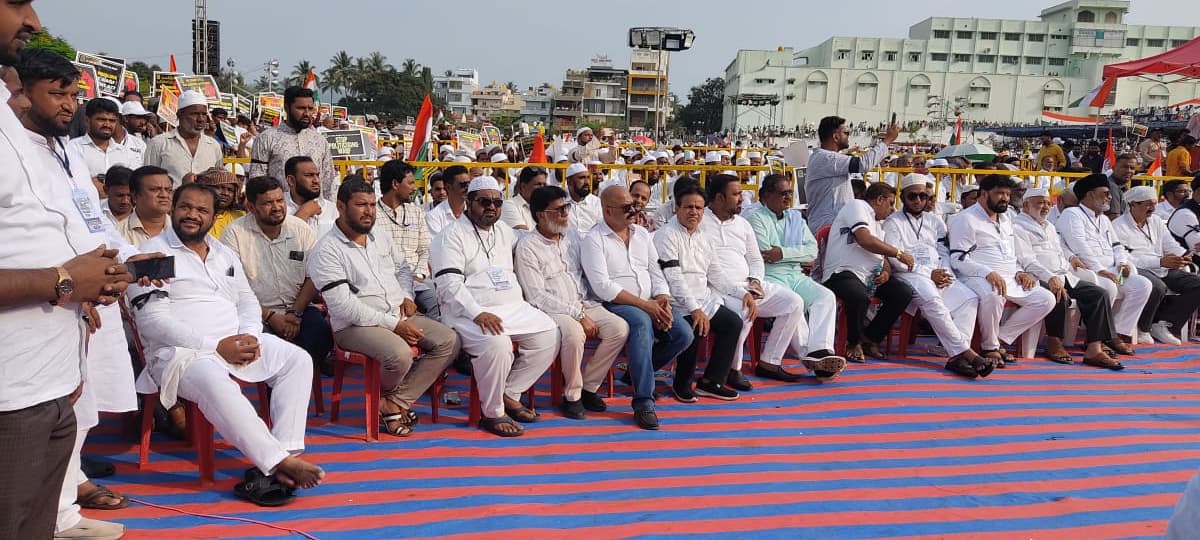 Mysuru, known as the cultural capital of Karnataka and once echoing with the roar of Tipu Sultan Shaheed, witnessed a different kind of resistance – peaceful, yet resolute. On the eve of Tipu Sultan’s martyrdom anniversary, thousands came together to uphold his legacy of valour and defiance against injustice. Speaker after speaker invoked his name as a symbol of standing firm against tyranny – past and present.
Mysuru, known as the cultural capital of Karnataka and once echoing with the roar of Tipu Sultan Shaheed, witnessed a different kind of resistance – peaceful, yet resolute. On the eve of Tipu Sultan’s martyrdom anniversary, thousands came together to uphold his legacy of valour and defiance against injustice. Speaker after speaker invoked his name as a symbol of standing firm against tyranny – past and present.
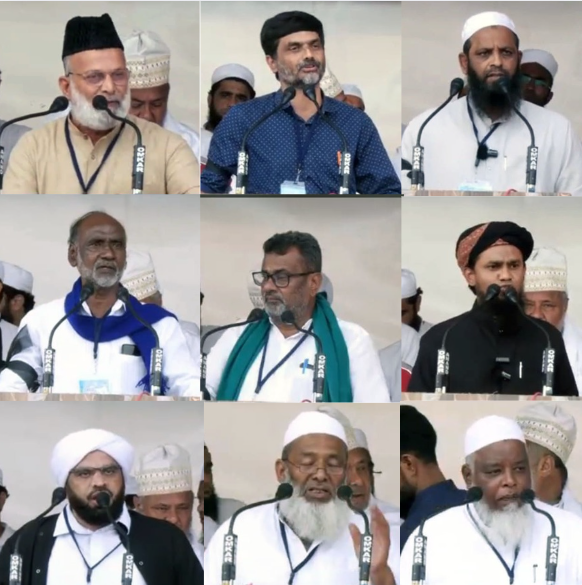 The protest site itself was a moving spectacle of democratic expression – a sea of people under the open skies, waving the national flag and holding placards that read “Waqf Hamara Haq Hai” (Waqf is our right), “Waqf Amendment Wapas Lo” (Withdraw the Waqf Amendment), “Le Ke Rahenge Azadi”, and “Jai Bhim”. The slogan “Jai Bhim”, evoking the legacy of Dr. B.R. Ambedkar, was not just an expression of solidarity with Dalit communities, but also a powerful call for their support in defending Waqf rights. The sprawling maidan shimmered with a colourful panorama of saffron, white, and green flags, fluttering alongside handwritten placards and banners asserting constitutional unity. The energy was electric; the spirit of unity, unmistakable.
The protest site itself was a moving spectacle of democratic expression – a sea of people under the open skies, waving the national flag and holding placards that read “Waqf Hamara Haq Hai” (Waqf is our right), “Waqf Amendment Wapas Lo” (Withdraw the Waqf Amendment), “Le Ke Rahenge Azadi”, and “Jai Bhim”. The slogan “Jai Bhim”, evoking the legacy of Dr. B.R. Ambedkar, was not just an expression of solidarity with Dalit communities, but also a powerful call for their support in defending Waqf rights. The sprawling maidan shimmered with a colourful panorama of saffron, white, and green flags, fluttering alongside handwritten placards and banners asserting constitutional unity. The energy was electric; the spirit of unity, unmistakable.
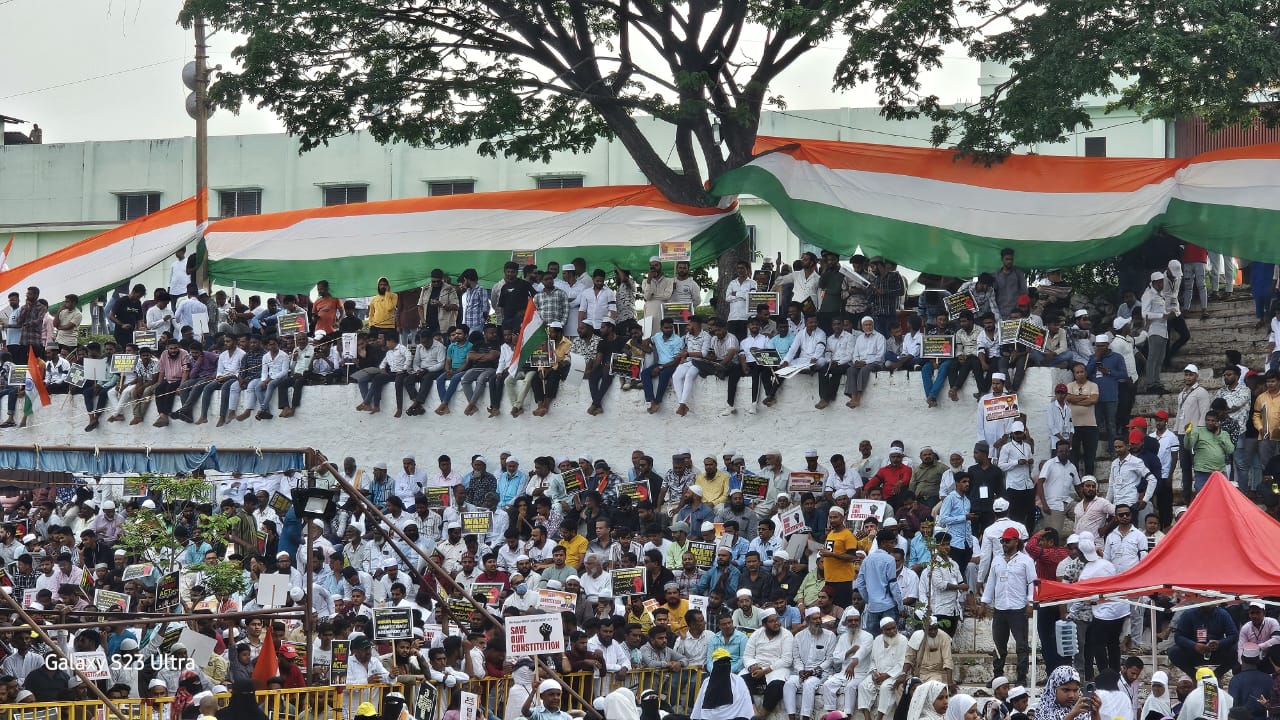 Speaking at the protest, Akbar Ali, senior leader of Jamaat-e-Islami Hind Karnataka, strongly condemned the government’s move. “This is no reform – it’s a constitutional assault disguised as administrative streamlining,” he declared. “Lies were told in Parliament, false affidavits were filed in court. The government is not safeguarding Waqf lands; it is attempting to seize them.”
Speaking at the protest, Akbar Ali, senior leader of Jamaat-e-Islami Hind Karnataka, strongly condemned the government’s move. “This is no reform – it’s a constitutional assault disguised as administrative streamlining,” he declared. “Lies were told in Parliament, false affidavits were filed in court. The government is not safeguarding Waqf lands; it is attempting to seize them.”
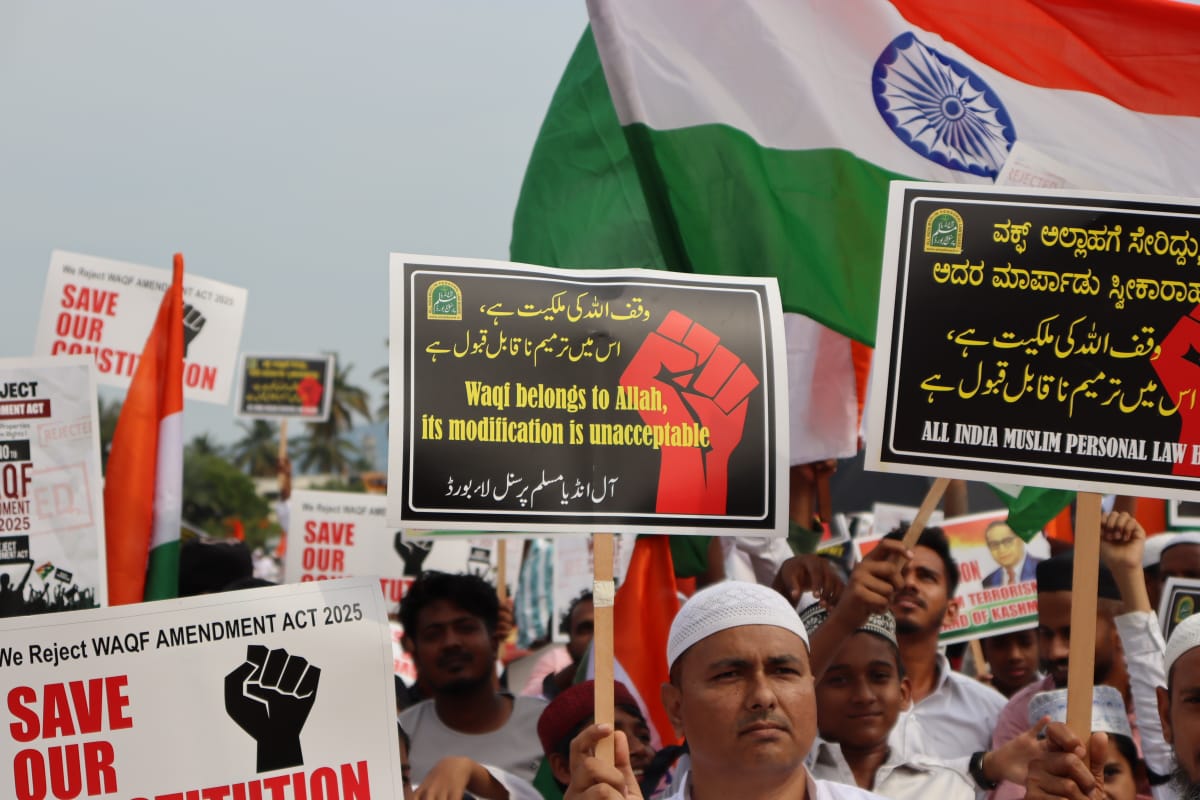 Dr. H.V. Vasu, a prominent political activist and long-time voice of Karnataka’s progressive movements, struck an emotional chord with the crowd: “Just as Shaheen Bagh became the cradle of resistance against the CAA, Mysuru today has become a lighthouse of protest against the Waqf Amendment.” He reminded the gathering that when citizens peacefully reclaim public spaces, even the most rigid policies begin to tremble.
Dr. H.V. Vasu, a prominent political activist and long-time voice of Karnataka’s progressive movements, struck an emotional chord with the crowd: “Just as Shaheen Bagh became the cradle of resistance against the CAA, Mysuru today has become a lighthouse of protest against the Waqf Amendment.” He reminded the gathering that when citizens peacefully reclaim public spaces, even the most rigid policies begin to tremble.
Badagalapura Nagendra, president of the Karnataka Farmers’ Union, emphasised the broader implications of the Act: “This isn’t just a Muslim issue. This Act, like the farm laws, erodes the rights of vulnerable communities. We, the farmers, who stood firm against unjust agricultural reforms, stand today with our Muslim brothers and sisters in defence of their constitutional rights.”
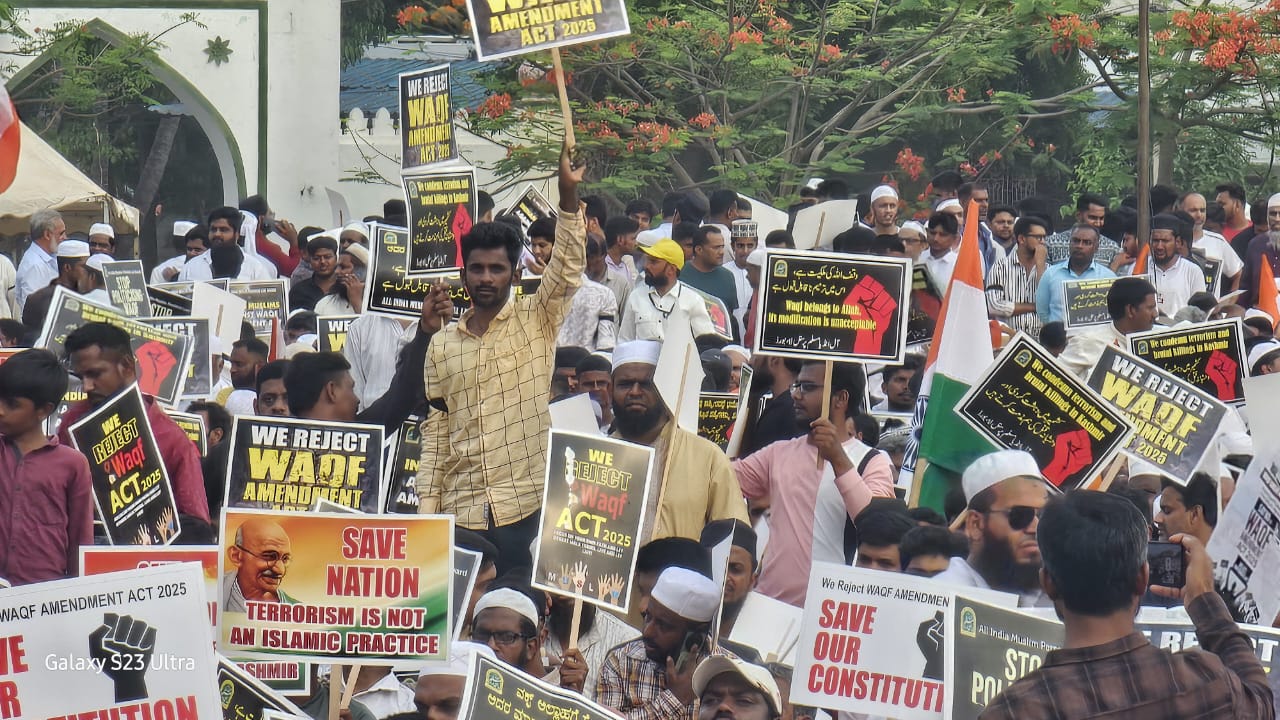 Bittayya Kote, district coordinator of the Dalit Sangharsha Samiti, warned of familiar threats. “The same poison of communal division sown during the Rath Yatra of 1991 is being spread again. But this time, the resistance is united – and it is stronger.”
Bittayya Kote, district coordinator of the Dalit Sangharsha Samiti, warned of familiar threats. “The same poison of communal division sown during the Rath Yatra of 1991 is being spread again. But this time, the resistance is united – and it is stronger.”
The programme began with a recitation of the Preamble of the Indian Constitution, followed by a minute of silence in memory of those who lost their lives in the recent Pahalgam terror attack in Kashmir. It was a solemn reminder of the collective grief the nation shares – and the urgency of protecting its founding values.
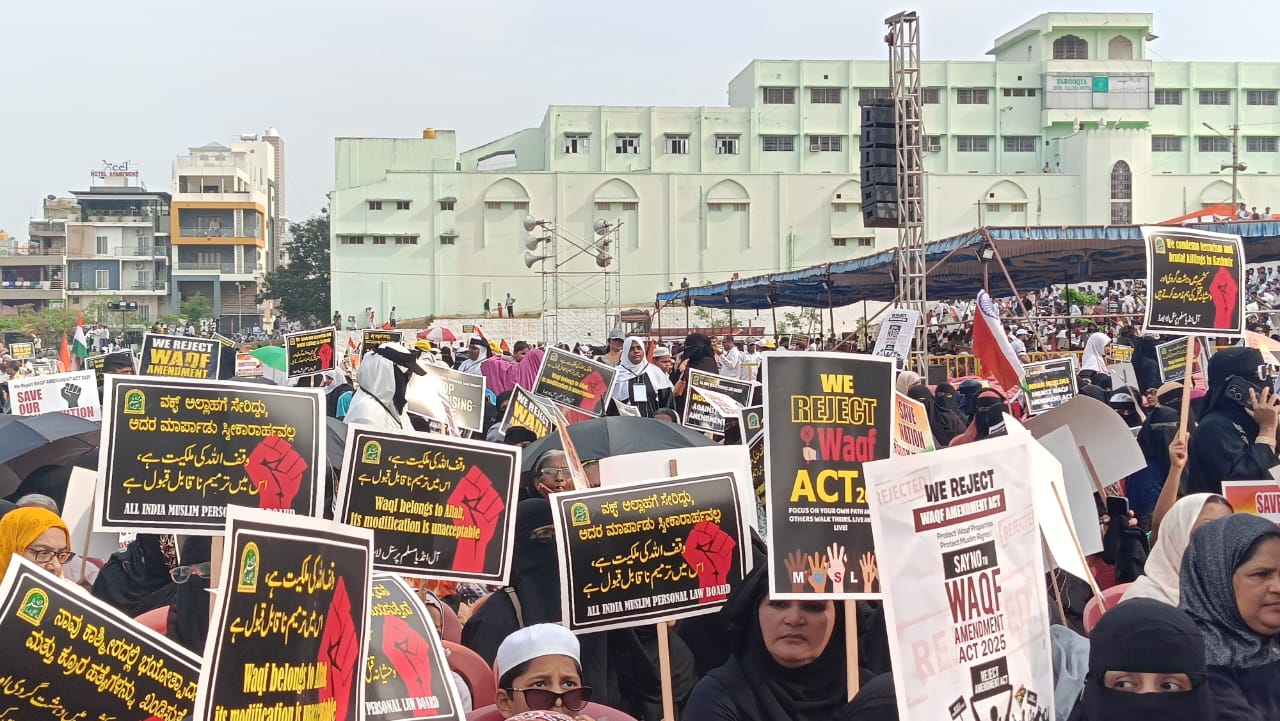 Among those on stage were former police officer Suhail Ahmad, Islamic scholars such as Maulana Jakawala, Maulana Ayyub Ansari, Maulana Kaleem-ur-Rehman, and civil society leaders, including former Mayor Arif Hussain, KPCC spokesperson M. Lakshman, SDPI president Abdul Majeed, and activist Gopal, among others.
Among those on stage were former police officer Suhail Ahmad, Islamic scholars such as Maulana Jakawala, Maulana Ayyub Ansari, Maulana Kaleem-ur-Rehman, and civil society leaders, including former Mayor Arif Hussain, KPCC spokesperson M. Lakshman, SDPI president Abdul Majeed, and activist Gopal, among others.
At the core of this protest lies the Waqf (Amendment) Act 2025, which, critics argue, violates Article 26 of the Indian Constitution, a provision that guarantees religious communities the right to manage their own affairs. The Act empowers district collectors to adjudicate Waqf property claims and eliminates the long-standing “Waqf by user” clause – raising fears of state encroachment, widespread dispossession, and eventual commercialisation of religious assets meant for public welfare.
Protesters argue that the Act paves the way for centralised control over properties that have historically supported education, healthcare, and social services within the Muslim community – transforming charitable trust into contestable land banks.
The Mysuru protest is not an isolated cry. It is part of a resonant chorus of democratic resistance, aligned with voices from Shaheen Bagh, the farmers’ movement, and countless other people’s struggles that have shaped India’s constitutional journey. As Dr. Vasu reminded the gathering, “When people occupy the moral high ground, even authoritarian regimes are forced to step back.”
As powerful chants filled the air – “Manuwadi Qanoon Wapas Lo!”, “We Stand for Constitution”, “Unity is Our Strength” – the message became unmistakable: this is not just a protest, it is a people’s movement, deeply rooted in India’s pluralism, democratic traditions, and commitment to justice.
In the words of one speaker:
“This is not the end – it’s the beginning of a nationwide struggle to reclaim our rights, protect our institutions, and uphold our Constitution.”
India stands at a crossroads. The challenge is not merely legal or political – it is moral. Will the world’s largest democracy listen to its citizens, or continue down the path of authoritarian silence?
[Mohammed Talha Siddi Bapa is a social commentator and media coordinator based in Karnataka. He writes on civil liberties, minority rights, and democratic movements in contemporary India.]


